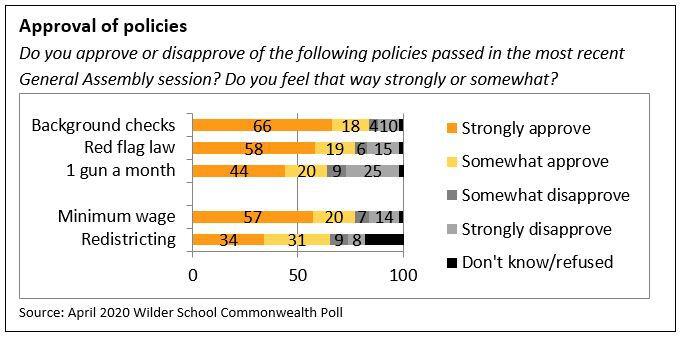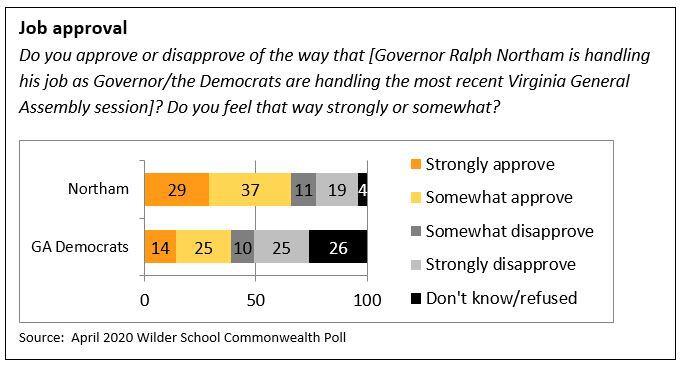April 21, 2020
Large majorities of Virginians support policies passed during General Assembly session
Share this story
Contacts:
Angelica Bega
Executive assistant to L. Douglas Wilder
(804) 828-8520 or aebega@vcu.edu
Farrah Stone, Ph.D.
Poll Director
(804) 305-3447 or stonefn@vcu.edu
More than 6-in-10 Virginians approve of various gun control, minimum wage and redistricting policies passed by the General Assembly, according to a new statewide poll conducted by the Center for Public Policy at the L. Douglas Wilder School of Government and Public Affairs at Virginia Commonwealth University.
Virginians showed strong support for universal background checks for gun purchases, with two-thirds strongly approving of the new legislation; the red flag law to remove firearms from those deemed dangerous, with 58% strongly approving; and raising the minimum wage, with 57% strongly approving. Majorities also approved of the one gun a month bill (64% strongly or somewhat approved) and the amendment to change the redistricting process (65% strongly or somewhat approved).

The poll also provides overall approval ratings for Gov. Ralph Northam and the Democrats in the General Assembly.
The telephone survey of 812 adults living in Virginia was conducted between March 25 and April 8. It has an estimated margin of error of 4.51 percentage points for all adults sampled, and 5.68 percentage points for likely voters. The entire report with detailed analysis tables and graphics can be found at https://oppo.vcu.edu/policy-poll/.
Among the poll’s key findings:
- A majority of Virginians strongly approve of raising the minimum wage. Fifty-seven percent strongly approve of the passage of legislation to raise the minimum wage to $12 by 2023. Gender, race and party identification were significant to the opinion. Women were more likely to strongly approve than men (61% versus 51%). Minorities were more likely to strongly approve than whites (69% versus 49%). Democrats and independents were also more likely to strongly approve than Republicans, with 85% and 52% compared to 32%.
- Virginians show strong support for gun control measures passed by the General Assembly. More than 6-in-10 respondents in every demographic category strongly approved of requiring universal background checks for gun sales. Additionally, there was majority support for the passage of “red flag” laws, allowing courts to remove firearms from those deemed dangerous, with 58% strongly approving. Gender, race and party identification were all significant to the level of approval. Women were more likely to strongly approve, with 64% compared to 50% of men. Minorities were also more like to strongly approve, with 71% compared to 50% of whites. Republicans were least likely to strongly approve with 41%, compared to 51% of independents and 82% of Democrats.
Limiting handgun purchases to one gun a month had the lowest level of approval, but still, 44% strongly approved of the measure. Region, education, race and party identification were all significant. Women, minorities and those with a college education were more likely to strongly approve. Northern Virginia was most likely to strongly approve, with 54%, followed by South Central (45%), Tidewater (43%), then the West and Northwest, with 35% and 33% respectively. - A majority of Virginians strongly or somewhat approve (65%) of the proposed constitutional amendment to change redistricting but almost 20% said “don’t know.” More than one-third of Virginians (34%) strongly approve of the proposed constitutional amendment that would change the process for congressional redistricting. Only 17% strongly or somewhat disapprove of the measure. Family income and party identification were significant to the choice. Those making more than $100,000 a year were more likely to strongly support the amendment, with 43%, compared to 30% of those making less than $100,000 per year. Democrats had the highest level of approval, with 50% strongly approving, compared to 31% of independents and 21% of Republicans.
- Gov. Ralph Northam has strong approval ratings, with 66% of Virginians strongly or somewhat approving of the way he’s handling the job of governor. Twenty-nine percent strongly approve and 30% strongly or somewhat disapprove. Race, region and party identification played a role in the opinion. Minorities were more likely to strongly approve, with 41%, compared to 22% of whites. Tidewater and South Central were the most likely to strongly approve, with 38% and 37% respectively, followed by the West (28%) and NOVA (24%). The Northwest was least likely to strongly approve with 15%. A majority of Democrats strongly approve (53%) compared to 22% of independents and 15% of Republicans. This is consistent with Virginians’ strong approval of how Northam is handling the COVID-19 crisis (76% strongly or somewhat approve) that was reported last week.

- Virginians were divided on how well Democrats handled the most recent General Assembly session and more than one quarter (26%) said “don’t know.” Thirty-nine percent strongly or somewhat approved, while 35% strongly or somewhat disapproved of the Democrats’ handling of the General Assembly session. Gender, education, race and party identification were significant to the choice. Women were more likely to strongly or somewhat approve with 45%, compared to 32% of men. Those with a college degree were more likely to strongly or somewhat approve with 45%, compared to 36% of those with a high school diploma or less. Minorities were more likely to strongly or somewhat approve with 48%, compared to 33% of whites. And Democrats were most likely to strongly or somewhat approve with 68%, compared to 35% of independents and 13% of Republicans.
“This poll [has been] taken at a time of extraordinary circumstances,” said L. Douglas Wilder, distinguished professor and former Virginia governor. “Some of the things passed by the legislature may face uncertainty because of lack of funding in the budget, which has yet to be enacted. There will have to be further educating of the voting public to inform them of the redistricting plan amending the constitution. In that polls are ‘snapshots,’ further polling is necessary as well as further direct involvement by the administration and legislative leadership.”
Subscribe to VCU News
Subscribe to VCU News at newsletter.vcu.edu and receive a selection of stories, videos, photos, news clips and event listings in your inbox.







